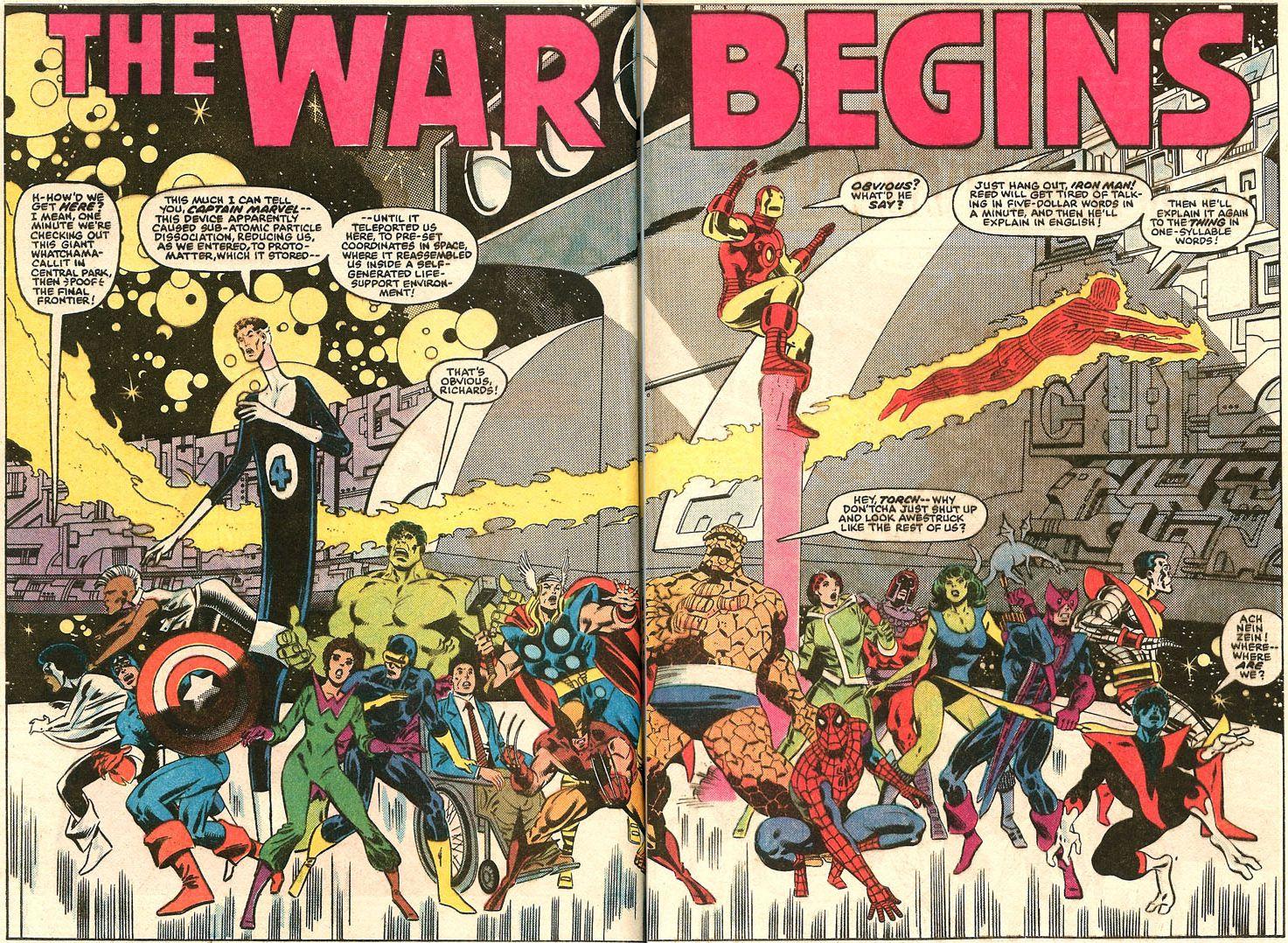
We’re living in the era of the big splash. Splashy hires, splashy launches, Splash Brothers. Anything for the attention economy. In comic books, the splash page is where an intimate page-turner can transform into something wider, deeper, and more breathtaking. Historically, the splash is a full page that grabs the reader’s attention. The grandest splash plays out across a two-page spread at the center of a comic, the same space where Playboy introduces its latest Playmate or a newspaper wedges its “double truck” feature story. It’s where the staple meets the binding, where a series of organized panels are replaced by an expansive landscape. It is the wide-angle shot. This is where artists can gather all the momentum built across an issue, a run, or a character’s arc, and deliver a visual wallop. It’s where Superman dies, where Batman’s back is broken. It’s a pacing trick meant to induce chills.

That’s the splash page from 1984’s Secret Wars, one of Marvel’s signature crossover events, a comic I can remember tearing through with a berserker tenacity when I first stumbled upon it as a kid. Look at all my heroes, nestled in the frame together.
Avengers: Endgame—the era-closing entry in the long-running Marvel Cinematic Universe—has a splash page moment of its own. It takes more than two hours to arrive at it, but it’s there—kinetic, colorful, delirious, and almost comically satisfying. It’s like Raphael’s The School of Athens, but with guns, shields, and a Pegasus. Dozens of heroes are crammed into the picture, each granted their own individual token of heroism, each flexing their distinctly metaphorical powers in the face of evil. For fans of this movie—and this is a movie that can comfortably be described as for the fans—Endgame delivers a Mjolnir of fan service to the chest. We’ve been served. On behalf of 11 years, 22 films, 37 stingers, nearly 48 hours of contiguous movie, and a hundreds-deep collection of creative artisans, Endgame delivers the final chapter in a journey that some describe as culturally suffocating and others think of as truly joyful. I tend to lean toward joy when it comes to Marvel, more impressed by the continuity and subtle evolution organized inside a massive corporate structure than I am suspicious of a cultural landscape hierarchically arranged by its superheroic intellectual property. Endgame is a movie that is by turns convoluted, congratulatory, and conscientious. But at the conclusion of this story—after the splash—I found myself thinking about the past, and why it cannot be ignored.
Avengers: Endgame is directed by the Brothers Russo—Joe and Anthony—who I would argue are the pivotal creative forces in this series of films. Endgame is their fourth directorial effort in the MCU—the most of any filmmaker—after two clever installments in the Captain America franchise and last year’s totemic Avengers: Infinity Wars. Prior to suiting up with Cap and Co., the Russos were best known for directing two modest feature comedies (Welcome to Collinwood and You, Me and Dupree) and several episodes of highly regarded, lightly seen, and often self-referential TV comedies, among them Community and Happy Endings. The Russos are inarguably gifted, deft at making ensemble patter feel like the most enjoyable thing in the world and B-plot navigation feel utterly necessary. This is key. The latticework that goes into workaday sitcoms has informed generations of consumers, and is what differentiates the enduring MCU movies, with their myriad plot strands and ancillary arcana, from your run-of-the-mill IP-bound sequels and groan-inducing expanded universes. There is a definitive sense in these movies, particularly in the past five years, that they are building to something—that each Infinity Gem unearthed, that each wisecrack cracked and weapon forged, will amount to a powerful reckoning. Endgame is the Russos’ splash page, the chance for them to collect all those years of accumulated investment and cash out. To wring fans free of their feelings. It mostly works.
The opening sequence of the movie begins with a character we did not see in Infinity War experiencing the real-time consequence of that movie’s big bad, the mad titan Thanos, making his grand gesture toward universal balance. After Thanos’s fateful finger snap, the man’s family is gone, and the credits hit. But rather than the propulsive and familiar Marvel theme that rises and falls as the studio’s heroes flash across the screen, the Russos have chosen a conspicuous needle drop: Traffic’s “Dear Mr. Fantasy.” The song’s lyrics are not subtle.
Dear Mister Fantasy play us a tune
Something to make us all happy
Do anything, take us out of this gloom
Sing a song, play guitar
Make it snappy
Get it, snappy? Pun aside, it’s a self-reflexive comment from the Russos. At its outset, Endgame is a dour bit of rockism—a testament to the power of earnest storytelling. To many, this is dramatic. When Iron Man was released, George W. Bush was the president. Time has passed, and then some. And after more than a decade, viewers are consumed by the fate of these characters. Who will die? has emerged as a primary concern ever since contract-term length and making peace with character death became common talking points among MCU fans. When half the galaxy was vanished after Thanos’s snap, the consequences of these films changed. But fans also want to be entertained. Play us a tune. Make us all happy. It sounds suspiciously like a frustrated filmmakers’ lament in the face of a changing moviegoing audience’s expectations.
So after that mournful opening, the Russos respond with a surprisingly, well, snappy movie larded with sight gags and slick repartee, in-jokes and rabbit-hole logic. It is a time-travel movie, a team-up movie, a tale of reunions and adorable little kids, space adventures and a big, smiling Hulk. There is an extended storytelling jag in the movie that sends our heroes back in time, to key moments in MCU history. These figures literally re-enter their own movies, and encounter older versions of themselves, saving the future from the recent past. At one point, Captain America has a showdown with Captain America, and comments on the curvature of his own ass. It’s like Ocean’s 12 for fanboys. This is a strange, often delightful movie. It’s also obsessed with itself and the world that Marvel, longtime creative shepherd Kevin Feige, and Disney have effectively maneuvered into pole position in popular culture across all these years.
There’s something fascinating about one of the most successful movies in history making very little sense to people who haven’t seen at least five other movies in this series. There really isn’t much precedent for it. But to appreciate Endgame and its need-to-know structure is to appreciate the Jenga tower they’ve been building all these years. Remove a block—say, 2014’s Guardians of the Galaxy—and coherence crumbles like so many Avengers at the end of Infinity War. I admire the gumption. The movie seems to actively relish how effectively it has kidnapped its fans. I, too, have Stockholm syndrome.
Endgame—perhaps the most anticipated movie since The Force Awakens—is likely to shatter records after eventizing itself effectively for years. There’s a reason: Heroes are dying. Something is ending. The second verse of “Dear Mr. Fantasy” is notable, in this context.
You are the one who can make us all laugh
But doing that you break out in tears
Ah, the tears. Some of the figures we say goodbye to in Endgame are predictable. Some are surprising. None are truly shocking. But the ways in which the chessboard is repositioned is fascinating. Endgame does not feature a tease for the future. It does not signal who the next intergalactic monster will be. It doesn’t even indicate whether there will ever be another Avengers movie. Given Disney’s recent acquisition of Fox, and with it the studio’s access to the X-Men and the Fantastic Four and myriad other characters, perhaps the Avengers are no longer the centrifugal force of Marvel. There are literally hundreds of other characters to explore. And Marvel will likely spend the next few years finding new ways to explore them, whether in theaters, on Disney+, or whatever consumable stream arrives next. How we get our expanded universes will never be the same. You may never have to sift through a Thor sequel to find out about a mysterious stone. Instead, you may have to engage with several dozen more hours of content just to get the gist that there is a stone in the first place.
But this is the end of this, and that is uniquely satisfying. And maybe the end of a kind of moviegoing, too. It’s natural to be frustrated by Marvel’s dominance and to worry about what’s lost at the expense of its power. But I haven’t resented this period. In some ways, I’m awed by its gale force. There’s no post-credits sequence in Endgame, and thus we have become unbound. I walked out thinking, I’m free. Which is why that splash page in the movie—a rip-roaring battle worthy of the moment—is the lasting image, the summation of this project. It’s a snapshot of this moment in time. It’s wish fulfilment for a generation raised on these movies. Time to grow up, kids. Puberty’s here.
